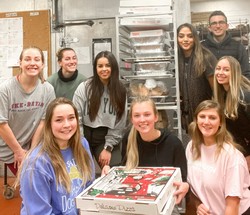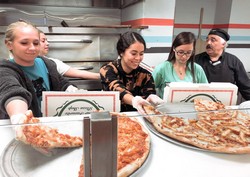Have you ever wondered what happens to all the leftover food at the dining hall and student center? What happens when the lights turn off and everyone begins settling in their dorms, getting ready for nightfall? Well, the answer lies in three words: Food Recovery Network.
Food Recovery Network (FRN) is a nationwide, nonprofit organization that has been fighting food waste and hunger while promoting sustainability on Monmouth’s campus since 2016.
Aneri Shah, Vice President of the University’s Food Recovery Network and senior business administration student, explained the food-recovering process. She said, “We go down to the student center and dining hall and package all of the leftover food that would have gone to waste. Once we’re done packaging it, the next morning we deliver it to two local churches that hand it out to the community.”
Members and volunteers of FRN bring the leftovers to the Lutheran Church of the Reformation on Thursdays and to Second Baptist Church on Saturdays. Both churches are located in Long Branch.
The Second Baptist Church hosts a “Meal at Noon” program, in which the recovered food is heated up and served to the community. The food is packaged on Wednesday and Friday nights, and leftovers from the other days of the week are saved for subsequent packaging days.
Monmouth’s chapter of FRN has recovered 20,705 pounds of food in total and 682 pounds this semester so far.
“We could go one night having about 280 pounds to another night having 580,” said Shah.
“There’s a really wide range,” added Diana Erascu, a senior health studies student and, President of FRN. “It really depends on the week and if there’s a lot of events happening on campus.”
Bryon Griffin, the Director of Meal at Noon at Second Baptist Church, explained that once the food is delivered on Saturdays at 10 a.m., the cooks decide whether to serve the University’s recovered food (in addition to the food already planned) or to freeze it for another time. Either way, the food you see remaining at the student center or dining hall is going in the hands of community members in need of a meal.
Griffin said, “Through the efforts of MU, Gourmet Dining, and the terrific, dedicated FRN students we are able to provide to our guests high quality, nutritious and delicious free meals. We appreciate it. Our guests appreciate it.” Griffin said that Meal at Noon provides over 6,000 free meals annually to our neighbors in need since 1997.
Erascu and Shah have been a part of the club since their freshman year. Now, as seniors, they have already been leaving a lasting imprint on food recovery at Monmouth. The duo has expanded the club just this year alone.
“It started with two of us in September and now we have 70 people trying to volunteer,” said Shah. “Everyone’s so interested in this. Once they figure out what it is, they want to find out more.”
Shah explained that around 10-11 students volunteer each session, all working towards making this campus a site for food recovery. Packaging time is usually around 40 minutes, depending on how many helping hands are available.
In fact, students work with the Gourmet Dining staff to ensure efficient packaging each week.

“They’re so nice about everything,” said Shah. “When we go to the student center, they’ll start helping us package the pizza, they’ll make jokes with us, and they’ll help us with anything we need.”
Debbie Avery, Food Court Supervisor of Gourmet Dining Services, said, “[Food recovery] is something I’m very interested in and passionate about. I hate waste. To know that there’s somebody that’s going to come and has the plan to repurpose [food], I think that’s a great thing.”
Avery continued, “I’ve worked in food my whole life. I’ve worked at 7/11, I’ve worked at Starbucks. When they throw food out, I could cry. Here, we do something much better with the food than throw it out.”
Recovering perishables that are cooked but not served touches the lives of less fortunate folks in the surrounding area.
“All of this food would have been going to waste, yet now it’s feeding so many people who don’t know where their next meal is coming from,” said Erascu. “That’s what motivates me.”
FRN would not be opposed to a collaboration with the Student Government Association (SGA), who created The Nest food pantry for students without a meal plan. The Nest strives to eliminate food insecurity, which the United States Department of Agriculture defines as an economic condition of limited or uncertain access to adequate food.
Mehdi Husaini, a senior biology student, President Pro-Tempore of SGA, and manager of The Nest, said, “The Food Recovery Network engages more with off-campus entities and deals with perishable products, so I’m not sure how we would mesh right now especially in the developing stages of our own efforts. However, I would definitely not rule out any sort of collaboration in the future since our purposes and guiding principles are so similar.”
“We have the same goal at the end of the day,” said Shah.
According to Monmouth’s website, 30 percent of students who attend a US college or university struggle with food insecurity.
“It’s important for people to be aware of food insecurity because it’s a really big issue all over the United States,” said Erascu. “If we start with a small community like this, maybe people can later on contribute in more impactful ways.”
Here is some food for thought: according to the US Department of Agriculture, about 30-40 percent of the food supply is wasted.
“America has such a high food waste epidemic,” said Shah, before mentioning that she has become more food conscious since becoming a part of FRN.
FRN also builds a sense of community on campus and in the surrounding West Long Branch area. The club collaborates with other campus organizations including Youth Activists, Beta Gamma Sigma (the Business Honor Society), Alpha Omicron Pi, Alpha Xi Delta, and Lambda Theta Phi. Volunteering with FRN provides philanthropic opportunities for fraternities and sororities.
Erascu, Shah, and their dedicated team of volunteers ensure that the remaining food at Monmouth isn’t going to end up in the trash at the end of the day.
On Saturday, Feb. 29, the food waste-fighting duo and their team will be serving food at the Second Baptist Church’s Meal at Noon program for the first time.
“We want to know who we’re actually serving and who we’re bringing food to,” said Erascu. “I’m most looking forward to the reaction on people’s faces and the happiness they will experience. We don’t really see that side of it.”
“We at Meal at Noon are truly blessed by the FRN program at MU,” said Griffin. “If every school, hospital, etc. had an FRN program, it would go a long way towards eliminating hunger in our country.”
The free lunch program relies on charitable donations to operate, which is being fostered by the selfless deeds of FRN members and volunteers.
“I’ve been able to contribute so much to this,” concluded Erascu. “This is something that I definitely want to continue through my whole life. Even going to my local food shelter and start volunteering there.”
The first Food Recovery Network originated at the University of Maryland in 2011, according to their official website. Since then, there are currently 230 chapters nationwide with a collective 3 million pounds of food recovered. MU students have been able to contribute to that growing number while giving back to the community over the past four years.
Other New Jersey universities with their own chapter of FRN include Montclair State, Rowan, Rutgers Newark, and Seton Hall.
If you have ever worried about food going to waste on campus, rest assured. The Food Recovery Network has it handled.
PHOTOS COURTESY of Aneri Shah



